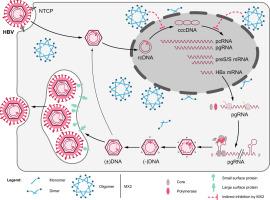当前位置:
X-MOL 学术
›
J. Hepatol.
›
论文详情
Our official English website, www.x-mol.net, welcomes your
feedback! (Note: you will need to create a separate account there.)
Interferon-inducible MX2 is a host restriction factor of hepatitis B virus replication
Journal of Hepatology ( IF 26.8 ) Pub Date : 2020-05-01 , DOI: 10.1016/j.jhep.2019.12.009 Yong-Xiang Wang 1 , Matthias Niklasch 2 , Tiantian Liu 1 , Yang Wang 1 , Bisheng Shi 3 , Wenjie Yuan 1 , Thomas F Baumert 4 , Zhenghong Yuan 1 , Shuping Tong 1 , Michael Nassal 2 , Yu-Mei Wen 1
Journal of Hepatology ( IF 26.8 ) Pub Date : 2020-05-01 , DOI: 10.1016/j.jhep.2019.12.009 Yong-Xiang Wang 1 , Matthias Niklasch 2 , Tiantian Liu 1 , Yang Wang 1 , Bisheng Shi 3 , Wenjie Yuan 1 , Thomas F Baumert 4 , Zhenghong Yuan 1 , Shuping Tong 1 , Michael Nassal 2 , Yu-Mei Wen 1
Affiliation

|
BACKGROUND AND AIM
Noncytolytic curing of hepatitis B virus (HBV) infected hepatocytes by cytokines including type I interferons (IFNs) is of importance for resolving acute and chronic infection. However, as IFNs stimulate hundreds of genes those most relevant for HBV suppression remain largely unknown. Amongst them are the large Mx GTPases. Human MX1 (or MxA) is active against many RNA viruses while MX2 (or MxB) was recently found to restrict human immunodeficiency virus 1, hepatitis C virus, and herpesviruses. Here we investigated the anti-HBV activity of MX2. METHODS
Potential anti-HBV activity of MX2 and functional variants was assessed in transfected and HBV infected hepatoma cells and primary human hepatocytes, employing multiple assays to determine HBV nucleic acids as well as their synthesis and decay. The specific roles of MX2 in IFN-α inhibition of HBV transcription and replication were addressed by MX2-specific shRNA interference (RNAi). RESULTS
MX2 alone as well as IFN-α substantially inhibited HBV replication, due to significant deceleration of the synthesis and slight acceleration of the turnover of viral RNA. RNAi knock-down of MX2 significantly reduced the inhibitory effects of IFN-α. Strikingly, MX2 inhibited HBV infection by reducing covalently closed circular DNA (cccDNA), most likely by indirectly impairing relaxed circular DNA to cccDNA conversion rather than destabilizing existing cccDNA. Various mutations affecting the GTPase activity and oligomerization status reduced MX2's anti-HBV activity. CONCLUSION
MX2 is an important IFN-α inducible effector that decreases HBV RNA levels but can also potently inhibit HBV infection by indirectly impairing cccDNA formation. MX2 likely has the potential of therapeutic application aimed at curing HBV infection by eliminating cccDNA.
中文翻译:

干扰素诱导型 MX2 是乙型肝炎病毒复制的宿主限制因子
背景与目的 用包括 I 型干扰素 (IFN) 在内的细胞因子对乙型肝炎病毒 (HBV) 感染的肝细胞进行非细胞溶解治疗,对于解决急性和慢性感染具有重要意义。然而,由于干扰素刺激数百个基因,那些与 HBV 抑制最相关的基因仍然很大程度上未知。其中包括大型 Mx GTPase。人类 MX1(或 MxA)对许多 RNA 病毒具有活性,而最近发现 MX2(或 MxB)可限制人类免疫缺陷病毒 1、丙型肝炎病毒和疱疹病毒。在这里,我们研究了 MX2 的抗 HBV 活性。方法 在转染和 HBV 感染的肝癌细胞和原代人肝细胞中评估 MX2 和功能变体的潜在抗 HBV 活性,采用多种测定法来确定 HBV 核酸及其合成和衰变。MX2 在 IFN-α 抑制 HBV 转录和复制中的具体作用由 MX2 特异性 shRNA 干扰 (RNAi) 解决。结果 单独的 MX2 以及 IFN-α 显着抑制了 HBV 复制,这是由于病毒 RNA 合成的显着减速和病毒RNA 周转的轻微加速。MX2 的 RNAi 敲低显着降低了 IFN-α 的抑制作用。引人注目的是,MX2 通过减少共价闭合环状 DNA (cccDNA) 来抑制 HBV 感染,这很可能是通过间接削弱松弛环状 DNA 到 cccDNA 的转化而不是破坏现有 cccDNA 的稳定性。影响 GTPase 活性和寡聚化状态的各种突变降低了 MX2 的抗 HBV 活性。结论 MX2 是一种重要的 IFN-α 诱导型效应物,可降低 HBV RNA 水平,但也可以通过间接削弱 cccDNA 的形成来有效抑制 HBV 感染。MX2 可能具有治疗应用的潜力,旨在通过消除 cccDNA 来治愈 HBV 感染。
更新日期:2020-05-01
中文翻译:

干扰素诱导型 MX2 是乙型肝炎病毒复制的宿主限制因子
背景与目的 用包括 I 型干扰素 (IFN) 在内的细胞因子对乙型肝炎病毒 (HBV) 感染的肝细胞进行非细胞溶解治疗,对于解决急性和慢性感染具有重要意义。然而,由于干扰素刺激数百个基因,那些与 HBV 抑制最相关的基因仍然很大程度上未知。其中包括大型 Mx GTPase。人类 MX1(或 MxA)对许多 RNA 病毒具有活性,而最近发现 MX2(或 MxB)可限制人类免疫缺陷病毒 1、丙型肝炎病毒和疱疹病毒。在这里,我们研究了 MX2 的抗 HBV 活性。方法 在转染和 HBV 感染的肝癌细胞和原代人肝细胞中评估 MX2 和功能变体的潜在抗 HBV 活性,采用多种测定法来确定 HBV 核酸及其合成和衰变。MX2 在 IFN-α 抑制 HBV 转录和复制中的具体作用由 MX2 特异性 shRNA 干扰 (RNAi) 解决。结果 单独的 MX2 以及 IFN-α 显着抑制了 HBV 复制,这是由于病毒 RNA 合成的显着减速和病毒RNA 周转的轻微加速。MX2 的 RNAi 敲低显着降低了 IFN-α 的抑制作用。引人注目的是,MX2 通过减少共价闭合环状 DNA (cccDNA) 来抑制 HBV 感染,这很可能是通过间接削弱松弛环状 DNA 到 cccDNA 的转化而不是破坏现有 cccDNA 的稳定性。影响 GTPase 活性和寡聚化状态的各种突变降低了 MX2 的抗 HBV 活性。结论 MX2 是一种重要的 IFN-α 诱导型效应物,可降低 HBV RNA 水平,但也可以通过间接削弱 cccDNA 的形成来有效抑制 HBV 感染。MX2 可能具有治疗应用的潜力,旨在通过消除 cccDNA 来治愈 HBV 感染。











































 京公网安备 11010802027423号
京公网安备 11010802027423号